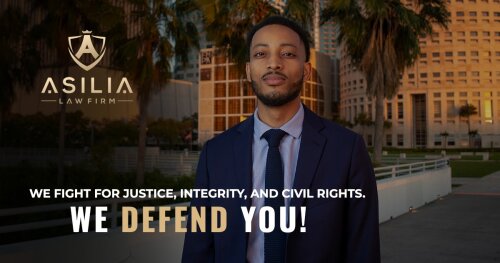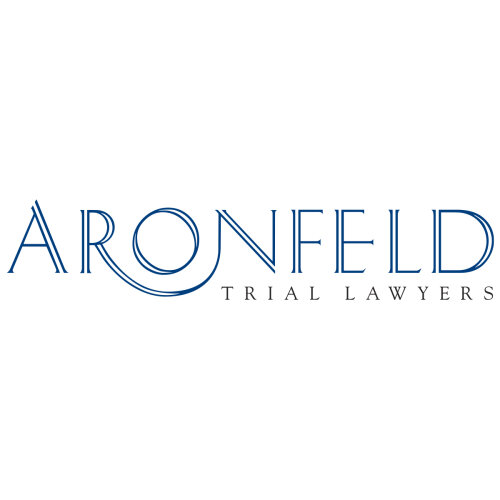Best Faith-Based Law Lawyers in Miami
Share your needs with us, get contacted by law firms.
Free. Takes 2 min.
List of the best lawyers in Miami, United States
About Faith-Based Law in Miami, United States
Faith-Based Law in Miami, United States, encompasses the legal considerations and frameworks applied when religious beliefs intersect with legal obligations and rights. This can involve a variety of issues ranging from employment law, where religious accommodations might be necessary, to family law, charitable activities, property law, and even aspects of criminal law. With Miami's diverse population, which includes a variety of religious backgrounds, navigating Faith-Based Law can be complex as it often involves balancing religious freedoms with federal, state, and local laws.
Why You May Need a Lawyer
Individuals and organizations might seek legal counsel in Faith-Based Law for several reasons:
- Employment Disputes: If you are facing issues regarding religious accommodations at work concerning schedules, attire, or practices.
- Property and Land Use: When dealing with zoning laws affecting places of worship or religious community centers.
- Family Law Issues: Situations such as divorce or custody battles where religious upbringing and practices are a concern.
- Non-Profit Compliance: For religious organizations needing guidance on legal compliance matters for charitable work.
- Religious Discrimination: If you experience discrimination based on religion in public services or private businesses.
Local Laws Overview
Miami operates under both Florida state laws and local municipal codes which can impact Faith-Based Law in several ways:
- Religious Exemptions: Certain local zoning laws may provide exemptions for religious organizations.
- Employment Regulations: Employers must reasonably accommodate employees' religious practices unless it poses an undue hardship.
- Religious Expression: Local schools and community spaces allow for religious expression, but there are limitations to ensure inclusivity.
- Anti-Discrimination Laws: Miami has strict regulations prohibiting discrimination based on religion in housing, employment, and public services.
Frequently Asked Questions
What is Faith-Based Law?
Faith-Based Law involves legal matters where religious beliefs and practices intersect with civil law. It often requires balancing religious freedoms with legal obligations.
Can my employer deny my request for a religious accommodation?
An employer can only deny such a request if it poses an undue hardship on the operation of the business. Legal consultation can help assess your specific situation.
How are disputes regarding religious property managed in Miami?
Disputes are managed according to zoning laws and other property regulations which may have specific considerations for religious properties.
Is religious discrimination illegal in Miami?
Yes, religious discrimination is illegal in Miami under both state and federal law. Victims of discrimination can seek legal recourse.
Can religious organizations be tax-exempt?
Many religious organizations can apply for tax-exempt status; however, they must comply with both federal and state regulations governing non-profits.
What legal options do I have if my child's school doesn't accommodate religious practices?
Schools must accommodate religious practices unless it disrupts the education process. Legal advice may be necessary to address any violations.
How are religious aspects considered in divorce cases?
While civil court handles divorces, religious considerations might take place in custody agreements concerning the child's religious upbringing.
Are there laws protecting religious speech in public places?
Yes, there are laws that protect religious expression in public spaces, but this must not infringe on other individuals' rights.
Can I form a religious corporation in Florida?
Yes, you can establish a religious corporation by filing specific documents with the state and adhering to certain legal requirements.
Are there any restrictions on religious funding for non-profits?
Non-profits can receive funding but must ensure financial operations are within compliance of non-profit regulations at both the state and federal levels.
Additional Resources
If you need more information or support regarding Faith-Based Law in Miami, consider the following resources:
- American Civil Liberties Union of Florida: Offers resources and legal support on issues of religious rights and civil liberties.
- Florida Department of Business and Professional Regulation: Provides guidance for religious non-profit incorporations.
- Local Legal Aid Societies: Offer assistance and advice for low-income individuals dealing with faith-based legal issues.
Next Steps
If you find yourself needing assistance with Faith-Based Law matters, consider taking the following steps:
- Identify Your Issue: Clearly define the legal issue you are facing.
- Consult Legal Professionals: Seek advice or representation from attorneys experienced in Faith-Based Law.
- Explore Mediation: Consider mediation if it is a viable option for dispute resolution.
- Document Everything: Keep detailed records of all incidents and communications related to your legal matter.
- Follow Up: Stay engaged with your legal representative and ensure all documentation and actions are completed on time.
Lawzana helps you find the best lawyers and law firms in Miami through a curated and pre-screened list of qualified legal professionals. Our platform offers rankings and detailed profiles of attorneys and law firms, allowing you to compare based on practice areas, including Faith-Based Law, experience, and client feedback.
Each profile includes a description of the firm's areas of practice, client reviews, team members and partners, year of establishment, spoken languages, office locations, contact information, social media presence, and any published articles or resources. Most firms on our platform speak English and are experienced in both local and international legal matters.
Get a quote from top-rated law firms in Miami, United States — quickly, securely, and without unnecessary hassle.
Disclaimer:
The information provided on this page is for general informational purposes only and does not constitute legal advice. While we strive to ensure the accuracy and relevance of the content, legal information may change over time, and interpretations of the law can vary. You should always consult with a qualified legal professional for advice specific to your situation.
We disclaim all liability for actions taken or not taken based on the content of this page. If you believe any information is incorrect or outdated, please contact us, and we will review and update it where appropriate.









